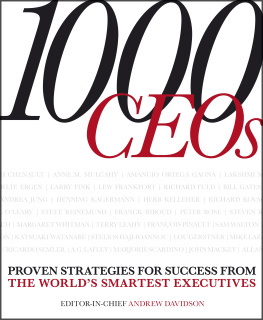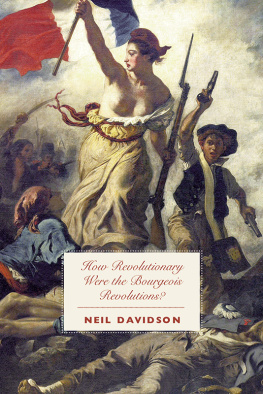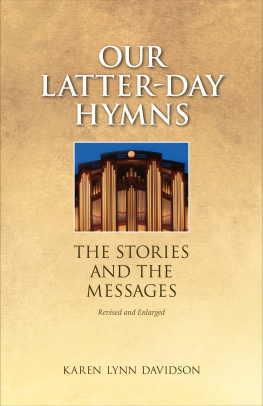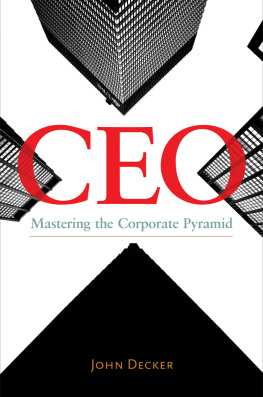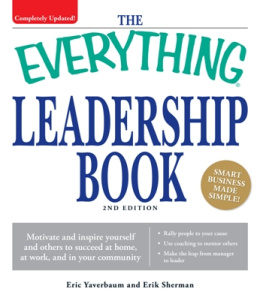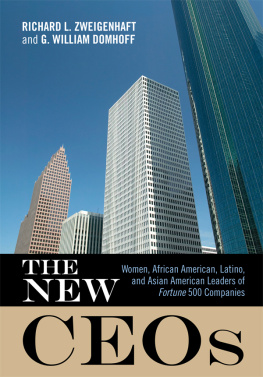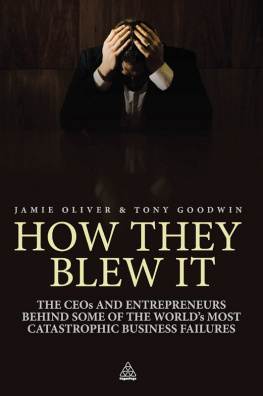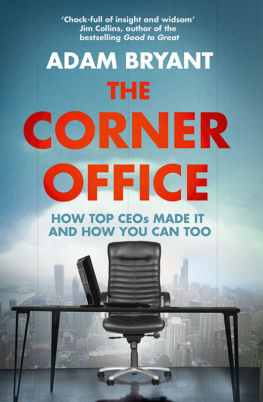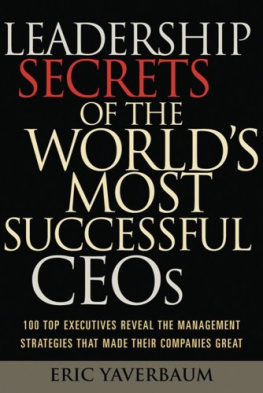Dorling Kindersley Limited
The Penguin Group
2 4 6 8 10 9 7 5 3 1
Published by the Dorling Kindersley Limited,
80 Strand, London WC2R 0RL
LONDON, NEW YORK,
MUNICH, MELBOURNE, DELHI
Dorling Kindersley Limited, Registered Offices: 80 Strand,
London WC2R 0RL, England
www.dk.com
First Published in the United States, 2009 by Dorling Kindersley Limited. ISBN: 9780756641702
Copyright 2009 Dorling Kindersley
Text copyright 2009 Andrew Davidson
This Digital Edition published 2009. ISBN: 9780756661243
E-Pub version prepared by DK Digital Content Services, London and DK Digital Media, Delhi.
No part of this publication may be reproduced, stored in a retrieval system,
or transmitted in any form or by any means, electronic, mechanical, photocopying, recording, or otherwise, without the prior written permission of the copyright owner.
Preface
Andrew Davidson
This book has two aims. Drawing on input from every continent on the globe, we chart the rise to success of the worlds most influential business leaders, as well as bosses of charity, arts, and health bodies. And we present their stories in a form that enables readers to draw practical lessons from the narrative of their successless about theory, and more about the hands-on examples of what it takes to make the tough decisions. Hence our tagline: Proven Strategies for Success.
Here youll find it all: rags to riches, rescues, luck, pluck, bloodbaths, feuds, and sheer hard endeavor. The structure is simple: a mix of long and short profiles, analyzing each individuals success and style, set against the sector in which they have excelled, grouped by vital characteristics. The writing aims to be sharp and succinct, and not afraid to criticize when criticism is called for. Key points are broken out, take-away lessons are highlighted. And the profiles are supplemented by a mix of pithy features by different authors, expanding out on the various topics raised.
So how did we choose the names for inclusion? We used a range of measures: size of company or organization; scale of reputation and renown; recommendations from academics and journalists; power-lists produced by media around the world; and more. Most choices are backed by straight data, such as gross revenue or stock market value. Some are pure instinct. We stuck to leadersno regional heads, no consultantsand broadened the search to include those who are CEO in everything except job title. We made sure our reach was wide enough to gather in many who had excelled outside the business sector, running not-for-profit bodies that can have greater impact than some of the biggest, globalized firms. And we added iconic bosses who have long left their posts, including Henry Ford, Walt Disney, Alfred P. Sloan, Jack Welch, and Este Lauder. They are chosen because of the profound influence they made on the way we structure and run modern organizations today, and the lessons they still have to teach us. And we produced all this in the teeth of the worst global downturn for half a century, so our list has constantly shifted. The effects of the credit crunch, and personal scandal, have already knocked a few big names out of the running. It also tightened the focus on what it takes to build a business that has long-term strength.
The upshot is a book quite unlike any that has been produced before. Here you will find the new corporate elite emerging from China side by side with the wily leviathans of North America; the Russian oligarchs striding out of the East to contrast with the growing strength of Central and South American business; European bosses facing down ever-larger Asian rivals; African vigor competing with Australian resilience. We hope you will find it encyclopedic in its scope, and invaluable as both a work of reference and a how-to guide. And yes, we expect to update it as top names change and new contenders come to the fore.
As I write, the current downturn seems, if anything, to have cemented many business leaders to their posts, with company boards preferring to stick with experience over youthful exuberance. But as the economic situation shifts, that will change. So this is just the start: 1000 CEOs will evolve, a work in progress, but with vital lessons to communicate. Never dull, never worthy and always usefulwe hope you enjoy reading it, and practicing what it teaches.
Andrew Davidson
Editor-in-chief
Introduction
Marshall Goldsmith
For three decades I have had the privilege of working with more than 100 CEOs and their management teams. One of the most important lessons Ive learned from these CEOs is that business is more than strategy, competency, and return on investment. A large part is about the soft issues like relationships, personal growth, and (yes, Ill say it) feelings! Henry Ford may have put it best when he said, A business that makes nothing but money is a poor business. I would venture to add that a CEO who improves only the bottom line is a poor CEO.
CEOs, perhaps more than any other occupational group, become synonymous with their jobs. They become the company. Who can think of Apple without thinking of Steve Jobs; Microsoft without thinking of Bill Gates; or Virgin without thinking of Richard Branson? After a while, the job of CEO becomes not just what these CEOs do, it defines to a large extent who they are. This job is far more than the bottom line. It is personal! CEOs, just like the rest of us, are real people. They are human beings with real stories behind their successes, and their failures. 1000 CEOs tells the stories of some of these great CEOs, what got them where they are, the critical decisions they made along the way and why. Of personal interest to me is the behavioral side of leadership. In other words, how CEOs guide their organizations with their personalities, their strengths and talents, and even their weaknesses.
Almost everyone I meet, including all the CEOs, is successful because of doing a lot of things right, and in spite of doing some things that arent. One of the greatest challenges I face in working with successful people is helping them see the difference between because of behaviors and in spite of behaviors. What Ive found, time and again, is that those people who do finally realize the difference, those individuals who recognize and grow past their bad habits, are the leaders who reach the greatest success both personally and professionally. For example, years ago, I coached a man who burned through people and their feelings like wildfire. As CFO, he had led the organization to the very peak of financial success, and still he was about to be fired. The firms leaders, who had promoted him to board status because of his great success, finally had a chance to bear witness to his horrible behavior. They, like the rest of the organization, were suddenly in a position to feel firsthand the wrath of Joe. They brought me in and the first thing I told him was, Youre already making millions a year. I cant help you make more money. But, lets talk about your ego. How do you treat people at home? He attempted to tell me he was sweet and loving at home. I called his wife! She laughed when I told her how Joe thought he was at home. His kids response was similar. Joe had a wake-up call with that little phone interaction. Not only had his board hired a coach to help him to change; his family also wanted him to change.
Joe decided then and there to change. The reason he decided this wasnt for money; it had nothing to do with the company. It had to do with his sons. He wanted to change because in twenty years, if his sons received similar feedback, he would be ashamed. Within a year, he was treating people much better. Follow-up feedback had him up past the 50th percentile! He successfully changed his behavior. The moral of the story? Anybody can change, but they have to want to change. Great CEOs want to change. They want to learn, grow, and develop, and they want those they lead to do the same. Being a successful CEO is as much about learning as it is about talent and luckprobably more.

